Central Participant Database: Difference between revisions
From LimeSurvey Manual
Aniesshsethh (talk | contribs) No edit summary |
Aniesshsethh (talk | contribs) No edit summary |
||
| Line 4: | Line 4: | ||
=Introduction= | =Introduction= | ||
This new feature allows the administrator to store the | This new feature allows the administrator to store the participant information to a central table that is independent of any token table. It's major advantages are : | ||
* The | * The central table acts as a backup so in case a user creates a new survey he would not have to go through the trouble of exporting it's participants to a CSV file and then importing them back into a new survey. | ||
* | * Users will only need to add the participants to the central table and then the same can be added to as many surveys as he wants. | ||
* In case of multiple users , | * In case of multiple users , the owners can choose to share his participants with others and also set access rights for the shared users. | ||
Along with this, there is | Along with this, there is an advanced attribute control and several other features. | ||
=The participants panel management tools= | =The participants panel management tools= | ||
| Line 15: | Line 15: | ||
<center>[[File:ParticipantPanel.png]]</center> | <center>[[File:ParticipantPanel.png]]</center> | ||
1) Home | 1) Home | ||
2) Information | 2) Information ( Summary of CPDB ) | ||
3) Display Participant’s Grid | 3) Display Participant’s Grid | ||
| Line 35: | Line 35: | ||
10) Panel Summary | 10) Panel Summary | ||
==Home | ==Home== | ||
Participant's Panel is a separate panel in the LimeSurvey administrator toolbar, so this icon takes | Participant's Panel is a separate panel in the LimeSurvey administrator toolbar, so this icon takes the user back to the administrator panel. | ||
==Information | ==Information== | ||
This screen shows | This screen shows the statistics of Central Database. This gives the summary of | ||
1) Total Participants in central table | 1) Total Participants in central table | ||
| Line 59: | Line 59: | ||
This is the main asset of the Participant's Panel. This is where you can perform majority of central Panel's operations, such as adding, deleting , exporting, adding to survey etc. | This is the main asset of the Participant's Panel. This is where you can perform majority of central Panel's operations, such as adding, deleting , exporting, adding to survey etc. | ||
Below is the screenshot of the same. | |||
<center>[[File:displayParticipant.png]]</center> | <center>[[File:displayParticipant.png]]</center> | ||
| Line 87: | Line 87: | ||
11) Hide/show grid | 11) Hide/show grid | ||
12) Subgrid | |||
===Add Participant=== | ===Add Participant=== | ||
You can easily add individual participant using the plus sign in the grid pager. For editing the added participant you can simply double click | You can easily add individual participant using the plus sign in the grid pager. For editing the added participant you can simply double click the participant and after editing you can press enter and any changes done will be saved to the server. | ||
<center>[[File:addParticipant.png]]</center> | <center>[[File:addParticipant.png]]</center> | ||
| Line 111: | Line 109: | ||
3) Delete Participant(s) from central panel,token tables and all associated responses | 3) Delete Participant(s) from central panel,token tables and all associated responses | ||
The first option deletes the participant from the central panel only, if the participant is in | The first option deletes the participant from the central panel only, if the participant is in any token table, he/she will not be removed. | ||
The second option deletes the participant from central as well | The second option deletes the participant from central as well all token tables, but his responses are not deleted. | ||
The third option deletes all traces of that participant from the system | The third option deletes all traces of that participant from the system including his responses. | ||
In all the three options the links created for the purpose of maintaining history related to a particular participant are also deleted. | In all the three options the links created for the purpose of maintaining history related to a particular participant are also deleted. | ||
| Line 125: | Line 123: | ||
===Export to CSV=== | ===Export to CSV=== | ||
When exporting to CSV | When exporting to CSV you are presented with a dialog box asking you to mark the additional attributes which you want to import. There is also an option for filtering the attributes. It will display all the attributes in the central table (visible/non-visible). | ||
The export to CSV | The export to CSV option works under either of the two conditions : | ||
1) Export filtered | 1) Export filtered | ||
| Line 133: | Line 131: | ||
2) Export All | 2) Export All | ||
It will export all or selected participants depending on your filtering criteria. | |||
<center>[[File:exporttoCSV.png]]</center> | <center>[[File:exporttoCSV.png]]</center> | ||
It will export | It will export the file as central_'the current time stamp'.csv . | ||
===Advance Search=== | ===Advance Search=== | ||
This is another major feature of Central Panel. It | This is yet another major feature of the Central Panel. It is a powerful feature which not only filters through the participants but also through additional attributes (visible and non-visible). This feature is also integrated with the grid. | ||
There are two | There are two levels of search that you can do. | ||
1) Single Search | 1) Single Search | ||
| Line 151: | Line 149: | ||
<center>[[File:advanceSearch.png]]</center> | <center>[[File:advanceSearch.png]]</center> | ||
You can add a complex condition using a plus sign next to the previous condition and remove | You can add a complex condition by using a plus sign next to the previous condition and remove a condition by using a minus sign in front of it. | ||
<center>[[File:advancesearchmultiple.png]]</center> | <center>[[File:advancesearchmultiple.png]]</center> | ||
This | This not only filters the participants in the grid but also those in the database that are not yet loaded, so it is an extensive search. | ||
===Navigation Bar=== | ===Navigation Bar=== | ||
To decrease load time of the grid we have used pagination | To decrease load time of the grid we have used pagination which allows the you to see the first X number of entries ( chosen by the you) and then load more if required. To control this we have pagination control option in the navigator bar. | ||
<center>[[File:navBar.png]]</center> | <center>[[File:navBar.png]]</center> | ||
Using the drop down you can select the entries to be loaded and with navigation buttons you can navigate and also use the text box to go to a certain page. Please note that the number of pages will reduce as you increase the number of | Using the drop down menu you can select the number of entries to be loaded and with navigation buttons you can navigate sequentially and also use the text box to go to a certain page. Please note that the number of pages will reduce as you increase the number of entries that visible per page. Also the searching and sorting of grid are not dependent on the records visible in the grid at any particular time but are done on the whole central table. | ||
===Share Participant=== | ===Share Participant=== | ||
This is another | This is another important feature of the Central Participants Database. You can share your participants with other users. You just have to select the participants you want to share and click on share. A modal box will open up which will allow you to select the user with whom you want to share.You can also set whether the user sharing your participant can edit those participants. If you set it no they will get an access denied error when trying to edit those shared entries. | ||
<center>[[File:shareParticipant.png]]</center> | <center>[[File:shareParticipant.png]]</center> | ||
| Line 181: | Line 179: | ||
3) only the participant's that I have selected | 3) only the participant's that I have selected | ||
As we know that the grid loads only the requested participants | As we know that the grid loads only the requested participants, thus ensuring minimum loading time for the user. So when you select a page on the grid (using multi-select or single select )that doesn't mean you have selected all the participants on the filtered participants from the database.So when exporting you are presented with the above mentioned three options which will be visible/invisible to you as per the present scenario. | ||
<center>[[File:addtoSurvey.png]]</center> | <center>[[File:addtoSurvey.png]]</center> | ||
For example if you have not selected any row and haven't done any search it will not show you any option and will offer you to add all the participants in the grid and so on... | For example if you have not selected any row and haven't done any search it will not show you any option and will only offer you to add all the participants in the grid and so on... | ||
<center>[[File:direct-all.png]]</center> | <center>[[File:direct-all.png]]</center> | ||
The title of the dialog box will show you the number of participants that | The title of the dialog box will show you the number of participants that are going to exported. Besides that, there is also a check box, that if checked, will take you to the token table of the survey to which you are adding the participants. | ||
After clicking next you will be taken to the attribute map page. | After clicking next you will be taken to the attribute map page. | ||
The attribute map page has three columns and uses advance drag and drop functionality. The first column shows all the attributes that are present in the central table. The second column gives space to the user to create new attributes. The third column shows the attributes in the token table to which the user is adding participants | The attribute map page has three columns and uses advance drag and drop functionality. The first column shows all the attributes that are present in the central table. The second column gives space to the user to create new attributes. The third column shows the attributes in the token table to which the user is adding participants. The user is free to choose to either create a new attribute in the token table to copy new values to or map the values from the attribute in the central table to the token table. | ||
<center>[[File:attributemap.png]]</center> | <center>[[File:attributemap.png]]</center> | ||
| Line 203: | Line 201: | ||
===Total Count=== | ===Total Count=== | ||
Number of participants out of total participants is displayed at the right of the navigator. | |||
===Hide/Show grid=== | ===Hide/Show grid=== | ||
| Line 211: | Line 209: | ||
===Subgrid=== | ===Subgrid=== | ||
For editing of attributes in the system we have implemented subgrid in the main grid that shows all the attributes in the system and also edit them. The main grid shows only the visible attributes, the rest of the attributes are available here and only fetched when required. The subgrid as the main grid allows inline editing of attributes and also sorting. | For editing of attributes in the system we have implemented the concept subgrid in the main grid that shows all the attributes in the system and also allows you to edit them. The main grid shows only the visible attributes, the rest of the attributes are available here and only fetched when required. The subgrid as the main grid allows inline editing of attributes and also sorting. It also shows the links to the surveys to which the participant is added to. In case the participant is not added to atleast one survey, this subgrid is not diplayed. When you expand the subgrid, all of the attributes in the system show up, but that doesn't means all the attribute values for that participant are saved in the database. Only when you add some value, that attribute value is saved for that particular participant. | ||
<center>[[File:subgrid.png]]</center> | <center>[[File:subgrid.png]]</center> | ||
| Line 219: | Line 217: | ||
==Import from CSV== | ==Import from CSV== | ||
This supports files with only *.csv extension. The rest of the settings are similar with what we have for "import CSV" under tokens. As in "add to survey" option we also have a drag and drop control over the attribute here. This feature scans all the headings in the CSV and shows them . You can map the attribute to an already existing central attribute or choose to create a new one. | |||
Steps | Steps to Import | ||
1) Select a file to import and associated settings. | 1) Select a file to import and specify associated settings. | ||
<center>[[File:importCSV.png]]</center> | <center>[[File:importCSV.png]]</center> | ||
2) Map the attributes in the CSV to | 2) Map the attributes in the CSV to those in the central table or create a new attribute. New attributes created will be of text box type but can be changed later. | ||
<center>[[File:attributeMapCSV.png]]</center> | <center>[[File:attributeMapCSV.png]]</center> | ||
| Line 233: | Line 231: | ||
In the example screenshot I have created a new attribute age and mapped sex with the attribute in the central table. | In the example screenshot I have created a new attribute age and mapped sex with the attribute in the central table. | ||
3) Wait for it process and show the summary. | 3) Wait for it to process and show the summary. | ||
<center>[[File:CSVsummary.png]]</center> | <center>[[File:CSVsummary.png]]</center> | ||
| Line 241: | Line 239: | ||
== Export All== | == Export All== | ||
This feature is for simplicity of the user. The user can click on it and can download all the participants that he has | This feature is for simplicity of the user. The user can click on it and can download all the participants that he has access to. | ||
== Global Participant’s Settings== | == Global Participant’s Settings== | ||
For security purposes the editing of user id is restricted as it's the user id associated with the participant which decides the ownership of the participant. For | For security purposes the editing of user id is restricted, as it's the user id associated with the participant which decides the ownership of the participant. For this there setting in the main CPDB panel which can be changed only by the super administrator. If the setting is set to yes, you can edit the user name field in the display grid. | ||
<center>[[File:userideditable.png]]</center> | <center>[[File:userideditable.png]]</center> | ||
When you double click on the row, you can see a drop down in the | When you double click on the row, you can see a drop down in the owner name field where the list of all users in the system are listed and you choose which one to give participant rights to. | ||
<center>[[File:displayparticipantedit.png]]</center> | <center>[[File:displayparticipantedit.png]]</center> | ||
| Line 255: | Line 253: | ||
== Attribute Control== | == Attribute Control== | ||
This is yet another advance feature of the | This is yet another advance feature of the Central Participants Database. The attribute control in the token system allows to add only the attribute of text type, which reduces complexity, but when you have to add a large number of attribute values, it becomes very tiring to type the exact same value, for example 'male', repeatedly. To overcome this problem we have introduced three different attribute types : | ||
1) Drop Down | 1) Drop Down | ||
| Line 263: | Line 261: | ||
3) Date Picker | 3) Date Picker | ||
You can choose either of the attribute types and associated UI will be presented to you while editing | You can choose either of the attribute types and associated UI will be presented to you while editing. For drop down , you will need to add possible values. Also, the attribute control has multilingual support. | ||
<center>[[File:attributeControl.png]]</center> | <center>[[File:attributeControl.png]]</center> | ||
As you can see there are already two existing attributes in the system. You can set their | As you can see there are already two existing attributes in the system. You can set their visibility right here by using the check box. The visibility will determine as to whether the attributes should be visible in the main grid or not. | ||
For adding a new attribute you just have to click on the plus sign and another row will pop up allowing you to put in basic details and saving the attribute. | For adding a new attribute you just have to click on the plus sign and another row will pop up allowing you to put in basic details and saving the attribute. | ||
| Line 277: | Line 275: | ||
For deleting an attribute in the system just click on the delete button next to the edit button. Clicking the delete button will not only delete the attribute but also the associated values. | For deleting an attribute in the system just click on the delete button next to the edit button. Clicking the delete button will not only delete the attribute but also the associated values. | ||
For | For advanced editing, such as adding of drop down values and adding multilingual languages, you need to click on the edit button. On clicking the edit button you will see something like this. | ||
<center>[[File:attributeadvanceedit.png]]</center> | <center>[[File:attributeadvanceedit.png]]</center> | ||
For adding a new language you can click on the plus sign and a new tab will pop up and you can add attribute name in that language there. | For adding a new language you can click on the plus sign and a new tab will pop up and you can add the attribute name in that language there. | ||
You can also add drop down values by selecting the drop down attribute type | You can also add drop down values by selecting the drop down attribute type. | ||
<center>[[File:commonsettings2.png]]</center> | <center>[[File:commonsettings2.png]]</center> | ||
You can edit the possible values of the drop down by clicking on the edit button or clicking on the value itself as it supports inline edit similar to what we have in the grid. Delete button is for deleting the | You can edit the possible values of the drop down by clicking on the edit button or clicking on the value itself as it supports inline edit similar to what we have in the grid. Delete button is for deleting the specific value. | ||
<center>[[File:editcommonsetting.png]]</center> | <center>[[File:editcommonsetting.png]]</center> | ||
| Line 295: | Line 293: | ||
== Share Panel== | == Share Panel== | ||
The share panel shows all the information related to the shared participant . Please note that this panel shows only the shared | The share panel shows all the information related to the shared participant. Please note that this panel shows only the shared participants owned by that particular user. | ||
This panel shows values like | This panel shows values like | ||
| Line 313: | Line 311: | ||
7) Can Edit | 7) Can Edit | ||
All this information is for viewing/sorting purposes only and only the | All this information is for viewing/sorting purposes only and only the "Can Edit" field is editable for the user. The can edit field as explained earlier determines whether to allow the shared participant to be editable by the sharer or not.Just clicking on the check box will make an AJAX call and save the changes on the server. | ||
== Panel Summary== | == Panel Summary== | ||
Panel summary is same as information, | Panel summary is same as information, only it is loaded when the CPDB panel is opened and it can be accessed again by using the information icon in the toolbar. | ||
Revision as of 22:35, 22 August 2011
Introduction
This new feature allows the administrator to store the participant information to a central table that is independent of any token table. It's major advantages are :
- The central table acts as a backup so in case a user creates a new survey he would not have to go through the trouble of exporting it's participants to a CSV file and then importing them back into a new survey.
- Users will only need to add the participants to the central table and then the same can be added to as many surveys as he wants.
- In case of multiple users , the owners can choose to share his participants with others and also set access rights for the shared users.
Along with this, there is an advanced attribute control and several other features.
The participants panel management tools

1) Home
2) Information ( Summary of CPDB )
3) Display Participant’s Grid
4) Import from CSV
5) Export All
6) Blacklist Control
7) Global Participant’s Settings
8) Attribute Control
9) Share Panel
10) Panel Summary
Home
Participant's Panel is a separate panel in the LimeSurvey administrator toolbar, so this icon takes the user back to the administrator panel.
Information
This screen shows the statistics of Central Database. This gives the summary of
1) Total Participants in central table
2) Participants Owned by you
3) Participants Shared with you
4) Participants you have shared
5) Blacklisted Participants
6) Total attributes in the central table
Display Participant’s Grid
This is the main asset of the Participant's Panel. This is where you can perform majority of central Panel's operations, such as adding, deleting , exporting, adding to survey etc.
Below is the screenshot of the same.

Explaination of the screenshot is given below
1) jqGrid header
2) Add Participant
3) Delete Participant
4) Reload Grid
5) Export to CSV ( Advanced )
6) Advance Search
7) Navigation Bar
8) Share Participant
9) Add to Survey
10) Total Count
11) Hide/show grid
12) Subgrid
Add Participant
You can easily add individual participant using the plus sign in the grid pager. For editing the added participant you can simply double click the participant and after editing you can press enter and any changes done will be saved to the server.
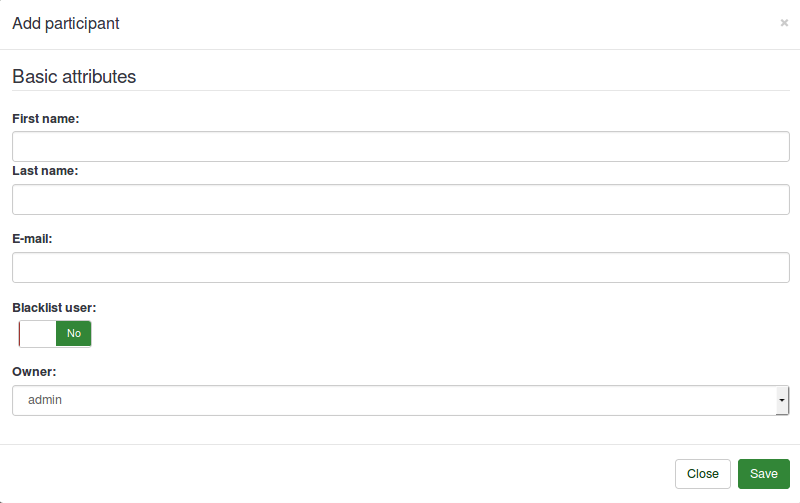
Delete Participant
You can easily mark a single participant to delete or you can choose all the participants in the grid to be deleted. There are three possible conditions when deleting a participant.

The explanation of the three conditions is
1) Delete Participant(s) from central participants panel only
2) Delete Participant(s) from central panel and token tables
3) Delete Participant(s) from central panel,token tables and all associated responses
The first option deletes the participant from the central panel only, if the participant is in any token table, he/she will not be removed.
The second option deletes the participant from central as well all token tables, but his responses are not deleted.
The third option deletes all traces of that participant from the system including his responses.
In all the three options the links created for the purpose of maintaining history related to a particular participant are also deleted.
Reload Grid
It simply reloads the grid from the server.
Export to CSV
When exporting to CSV you are presented with a dialog box asking you to mark the additional attributes which you want to import. There is also an option for filtering the attributes. It will display all the attributes in the central table (visible/non-visible).
The export to CSV option works under either of the two conditions :
1) Export filtered
2) Export All
It will export all or selected participants depending on your filtering criteria.
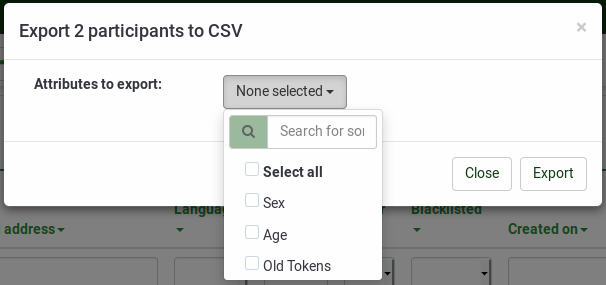
It will export the file as central_'the current time stamp'.csv .
Advance Search
This is yet another major feature of the Central Panel. It is a powerful feature which not only filters through the participants but also through additional attributes (visible and non-visible). This feature is also integrated with the grid.
There are two levels of search that you can do.
1) Single Search
2) Combined Search
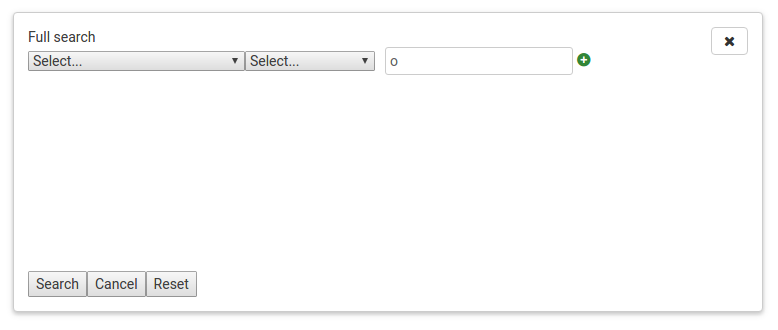
You can add a complex condition by using a plus sign next to the previous condition and remove a condition by using a minus sign in front of it.
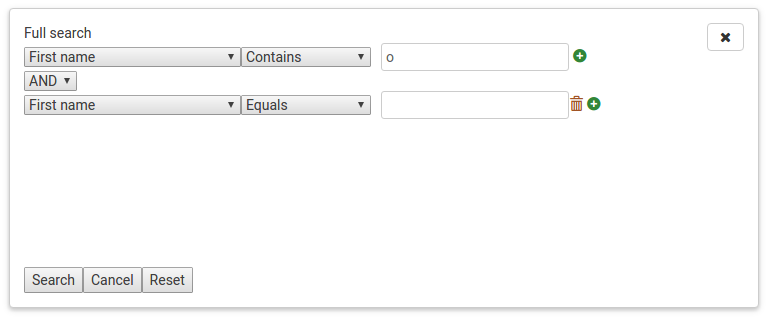
This not only filters the participants in the grid but also those in the database that are not yet loaded, so it is an extensive search.
To decrease load time of the grid we have used pagination which allows the you to see the first X number of entries ( chosen by the you) and then load more if required. To control this we have pagination control option in the navigator bar.
Using the drop down menu you can select the number of entries to be loaded and with navigation buttons you can navigate sequentially and also use the text box to go to a certain page. Please note that the number of pages will reduce as you increase the number of entries that visible per page. Also the searching and sorting of grid are not dependent on the records visible in the grid at any particular time but are done on the whole central table.
This is another important feature of the Central Participants Database. You can share your participants with other users. You just have to select the participants you want to share and click on share. A modal box will open up which will allow you to select the user with whom you want to share.You can also set whether the user sharing your participant can edit those participants. If you set it no they will get an access denied error when trying to edit those shared entries.

Add to survey
Add to survey can be done at three levels :
1) all participants in current search
2) all participants
3) only the participant's that I have selected
As we know that the grid loads only the requested participants, thus ensuring minimum loading time for the user. So when you select a page on the grid (using multi-select or single select )that doesn't mean you have selected all the participants on the filtered participants from the database.So when exporting you are presented with the above mentioned three options which will be visible/invisible to you as per the present scenario.

For example if you have not selected any row and haven't done any search it will not show you any option and will only offer you to add all the participants in the grid and so on...
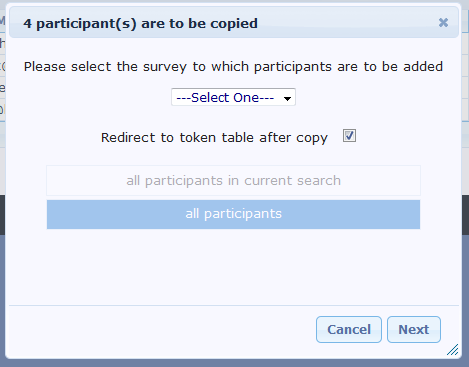
The title of the dialog box will show you the number of participants that are going to exported. Besides that, there is also a check box, that if checked, will take you to the token table of the survey to which you are adding the participants.
After clicking next you will be taken to the attribute map page.
The attribute map page has three columns and uses advance drag and drop functionality. The first column shows all the attributes that are present in the central table. The second column gives space to the user to create new attributes. The third column shows the attributes in the token table to which the user is adding participants. The user is free to choose to either create a new attribute in the token table to copy new values to or map the values from the attribute in the central table to the token table.
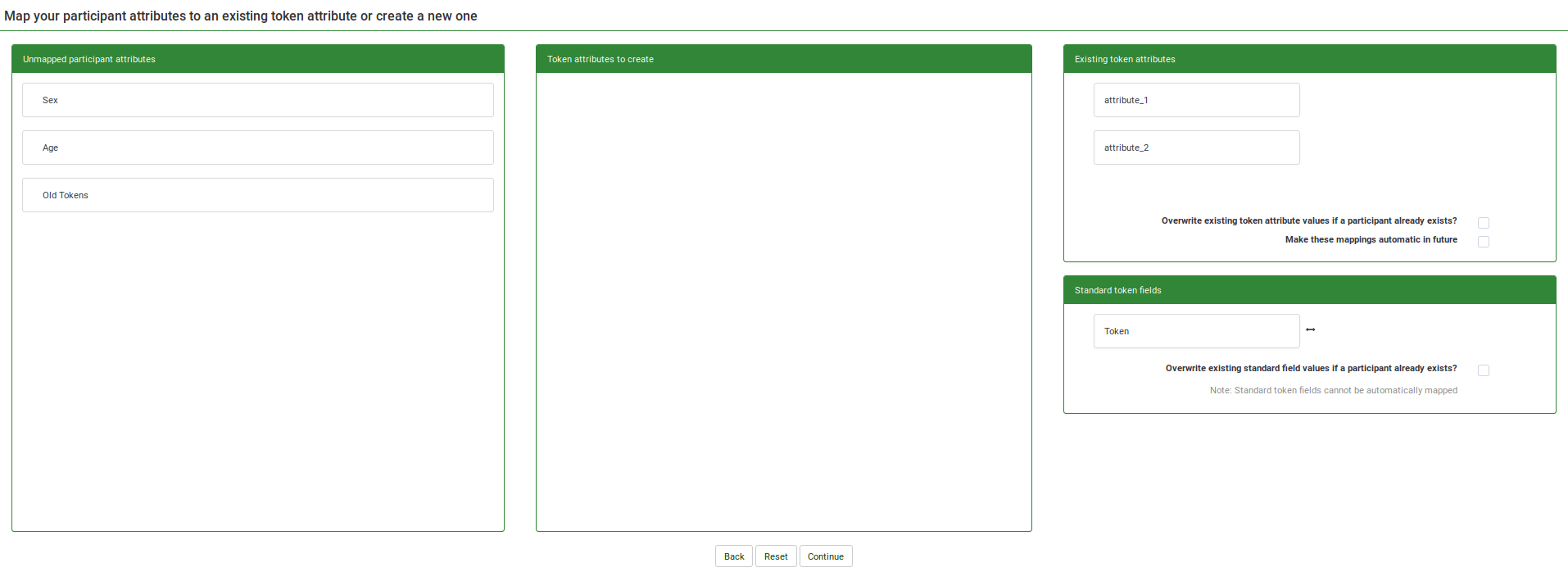
After you have mapped all the attributes, you can click on continue and after processing the participants a summary page will show up that will tell you how many participants were successfully copied, after which if you have asked for redirection you will be redirected to the token table table or else you will be redirected to the central grid.
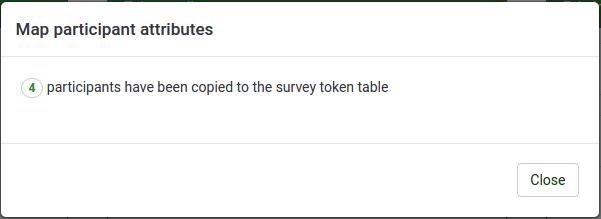
Total Count
Number of participants out of total participants is displayed at the right of the navigator.
Hide/Show grid
Simply hide or show the grid.
Subgrid
For editing of attributes in the system we have implemented the concept subgrid in the main grid that shows all the attributes in the system and also allows you to edit them. The main grid shows only the visible attributes, the rest of the attributes are available here and only fetched when required. The subgrid as the main grid allows inline editing of attributes and also sorting. It also shows the links to the surveys to which the participant is added to. In case the participant is not added to atleast one survey, this subgrid is not diplayed. When you expand the subgrid, all of the attributes in the system show up, but that doesn't means all the attribute values for that participant are saved in the database. Only when you add some value, that attribute value is saved for that particular participant.
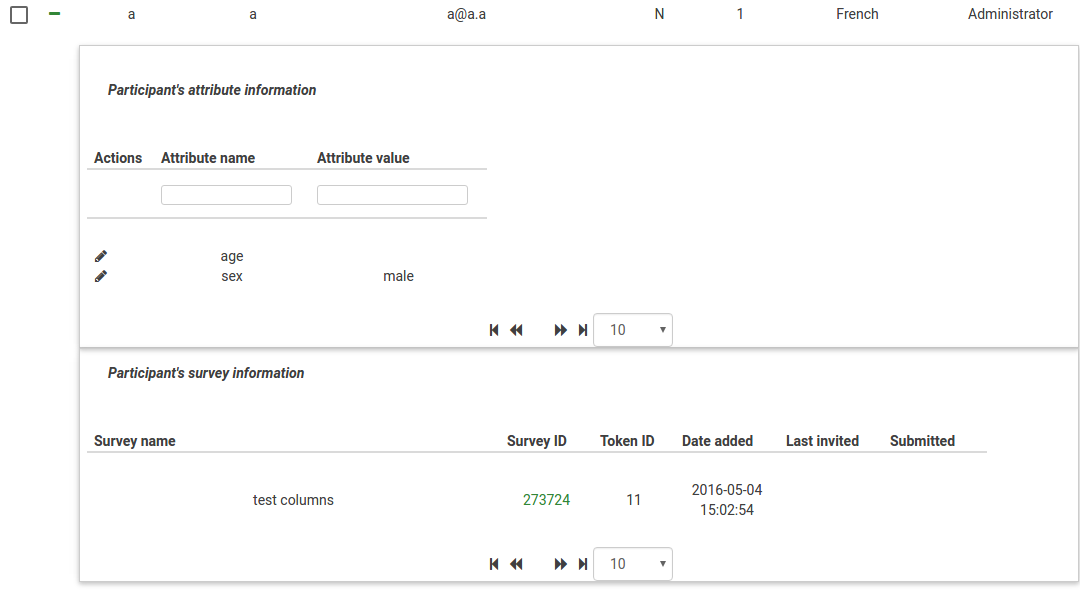
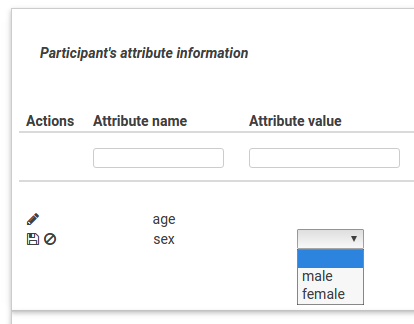
Import from CSV
This supports files with only *.csv extension. The rest of the settings are similar with what we have for "import CSV" under tokens. As in "add to survey" option we also have a drag and drop control over the attribute here. This feature scans all the headings in the CSV and shows them . You can map the attribute to an already existing central attribute or choose to create a new one.
Steps to Import
1) Select a file to import and specify associated settings.
2) Map the attributes in the CSV to those in the central table or create a new attribute. New attributes created will be of text box type but can be changed later.

In the example screenshot I have created a new attribute age and mapped sex with the attribute in the central table.
3) Wait for it to process and show the summary.
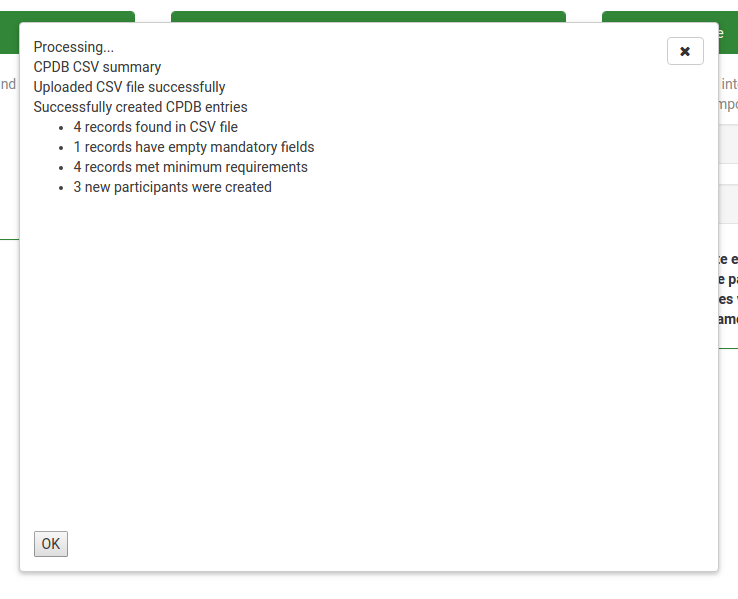
Clicking ok will redirect you to the display participants screen showing the newly imported participants.
Export All
This feature is for simplicity of the user. The user can click on it and can download all the participants that he has access to.
Global Participant’s Settings
For security purposes the editing of user id is restricted, as it's the user id associated with the participant which decides the ownership of the participant. For this there setting in the main CPDB panel which can be changed only by the super administrator. If the setting is set to yes, you can edit the user name field in the display grid.

When you double click on the row, you can see a drop down in the owner name field where the list of all users in the system are listed and you choose which one to give participant rights to.

Attribute Control
This is yet another advance feature of the Central Participants Database. The attribute control in the token system allows to add only the attribute of text type, which reduces complexity, but when you have to add a large number of attribute values, it becomes very tiring to type the exact same value, for example 'male', repeatedly. To overcome this problem we have introduced three different attribute types :
1) Drop Down
2) Text Box
3) Date Picker
You can choose either of the attribute types and associated UI will be presented to you while editing. For drop down , you will need to add possible values. Also, the attribute control has multilingual support.
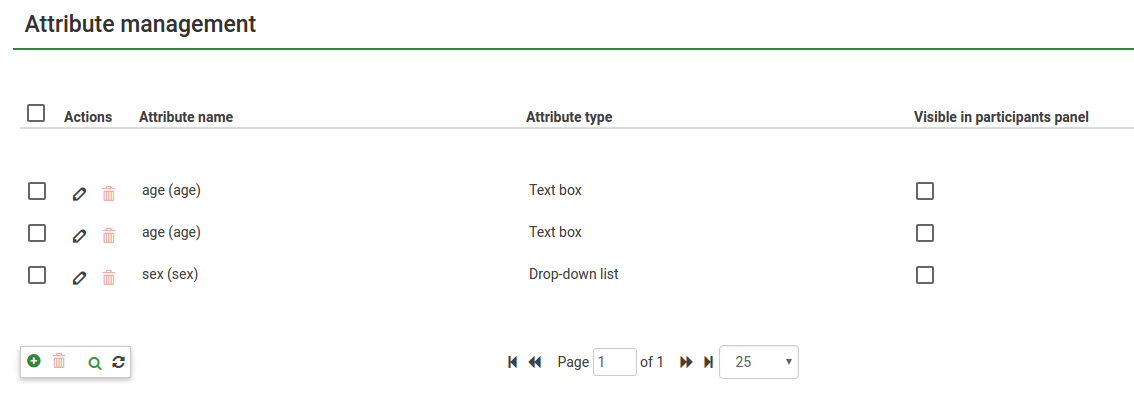
As you can see there are already two existing attributes in the system. You can set their visibility right here by using the check box. The visibility will determine as to whether the attributes should be visible in the main grid or not.
For adding a new attribute you just have to click on the plus sign and another row will pop up allowing you to put in basic details and saving the attribute.
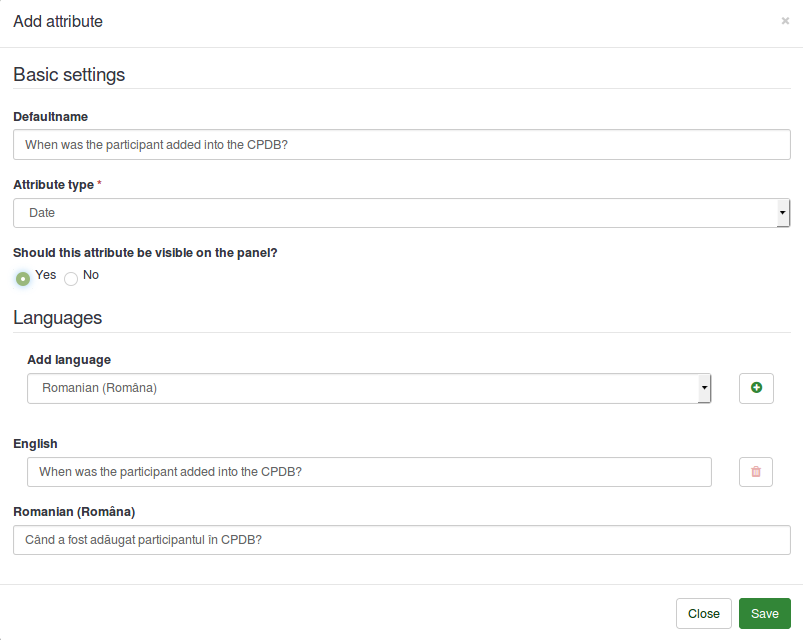
You can save the attribute by using the save button or by pressing enter after entering the attribute name.
For deleting an attribute in the system just click on the delete button next to the edit button. Clicking the delete button will not only delete the attribute but also the associated values.
For advanced editing, such as adding of drop down values and adding multilingual languages, you need to click on the edit button. On clicking the edit button you will see something like this.
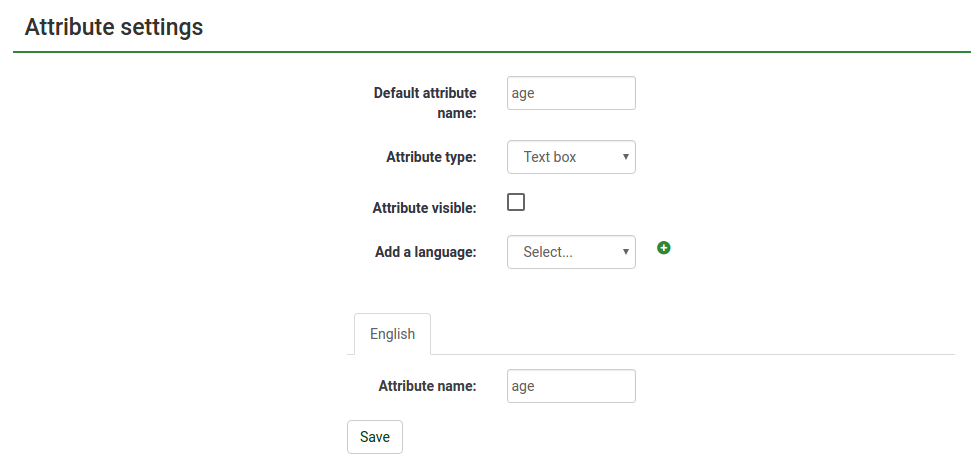
For adding a new language you can click on the plus sign and a new tab will pop up and you can add the attribute name in that language there.
You can also add drop down values by selecting the drop down attribute type.

You can edit the possible values of the drop down by clicking on the edit button or clicking on the value itself as it supports inline edit similar to what we have in the grid. Delete button is for deleting the specific value.
As you can see in the screenshots, the entire attribute properties can be edited here.
The share panel shows all the information related to the shared participant. Please note that this panel shows only the shared participants owned by that particular user.
This panel shows values like
1) First Name
2) Last Name
3) E-Mail
4) Shared With
5) Owner
6) Date Added
7) Can Edit
All this information is for viewing/sorting purposes only and only the "Can Edit" field is editable for the user. The can edit field as explained earlier determines whether to allow the shared participant to be editable by the sharer or not.Just clicking on the check box will make an AJAX call and save the changes on the server.
Panel Summary
Panel summary is same as information, only it is loaded when the CPDB panel is opened and it can be accessed again by using the information icon in the toolbar.